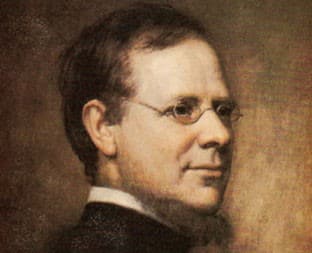December 12, 2016
Issue No. 14, December 2016
A Monthly Newsletter for Paulist Associates
The Associates World is the newsletter of the Paulist Associates. You can download a copy of this newsletter in PDF format (excellent for printing), or scroll down to read it on the Web.
- Isaac Thomas Hecker, Servant of God and Founder of the Paulists
- BREAD
- Isaac Says
- Highlights of the Life of Isaac Hecker
- A Sermon on Christmas Day, 1870 by Servant of God, Isaac Thomas Hecker
- Prayer for the Intercession of Father Isaac T. Hecker
- City Father — Blog Post on December 22, 2010
- Errata
- Isaac’s First Letter Home – December 24, 1842
- Save the Date
- Proposed Program for January
- Fr. Hecker Abstracts
- Contacts
- Promise
Died December 22, 1888
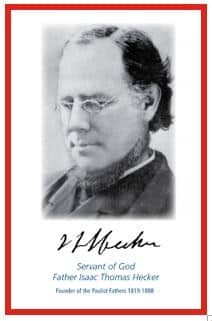
In this issue, we begin with a poem entitled “Bread,” written by Fr. Frank Desiderio, CSP in tribute to Hecker. He provides us with a concise study of Hecker’s entire life. While biographical in nature, these verses also offer us keen insight into the milieu of America in the 19th century and other influences on Hecker’s life as a spiritual seeker. In addition, Fr. Frank captures a key element in any sketch of the first Superior General of the Paulists: attentive to the Holy Spirit, Hecker discerned how best to fulfill God’s will in mission, ministry, and life. Hecker not only wanted that for himself — he prayed for that for all people.
John Farina compiled five essays for Hecker Studies: Essays on the Thought of Isaac Hecker, a book published for the 125th anniversary of the Paulist Fathers. The editor included a short chronology of events in Hecker’s life. We thought this one-page quick reference guide would be a handy resource.
The “Isaac Says” quote for this month is a few lines from his diary on his 25th birthday in 1844, his first birthday following his conversion to Roman Catholicism.
Excerpts from a Christmas Day sermon delivered in 1870 by Hecker at St. Paul’s Church in Manhattan shed light on his belief in God’s infinite love incarnated in Christ Jesus — mysteriously, mystically, miraculously. This love is given “to all who earnestly and sincerely seek God. To all, whether Jew or Gentile, Christian or non-Christian for God is the Father of all …” This is a timeless message, one we need to hear today, 146 years after Hecker first preached it.
Featured in this month’s “Fr. Hecker Abstract” is Isaac T. Hecker, the Diary: Romantic Religion in Ante-Bellum America, edited by John Farina. In this volume, we learn in Hecker’s own words of his intimate thoughts and spiritual moments, including his first mystical experience. This diary gives us a glimpse into a critical time for Hecker, seeking God and finding faith that led him to the Roman Catholic church.
There is a short piece about the first letter Isaac wrote to his mother in December 1842, while he visited Orestes Brownson.
As always, we include “Prayer for the Intercession of Father Isaac T. Hecker.” We encourage all to pray this prayer.
There is a reprint of Fr. Ron Franco’s blog post from December 22, 2010, marking the anniversary of Hecker’s death. Fr. Ron reflects on Hecker’s final blessing of his Paulist brothers, just before his death.
This month is a time for all of us especially to seek Hecker’s blessing. We rely on Hecker’s example of remaining open to the promptings of the Holy Spirit and witnessing to the good news of Christ Jesus in the age in which we live. We thank God for Servant of God Issac Hecker’s life.
by Fr. Frank Desiderio, CSP
Paulist Associates National Director
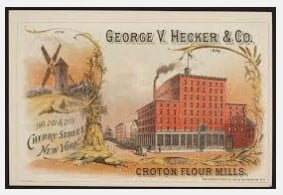
lager beer and a free lunch for workers
Prussian pig knuckles, Bavarian pretzels
for a nickel a mug, six days a week.
On Sundays, families come together
to eat, sing, play games and drink beer,
cleaner than the water, in the front room.
In the back, men’s talk turns to their troubles.
The lawyer and shoemaker and baker
bemoan Boss Tweed’s latest betrayal.
The immigrants who proved their metal
at Antietam are forged into reformers.
The baker-boy muscles his cart of bread
over the rough hewn cobblestone streets
almost past the saloon waiting for the loaves
of brown and rye, his eyes gaze far ahead.
Always the call, steady under the noise,
the press of steam with no engine to run
an urgent beckon to an unknown home
to be more, make his mark, do the great thing.
From his near death time when a pox ravaged
the tenements, he, wrapped in angel wings,
his mother’s fervent prayers were answered
“God has some work for me yet to be done. “
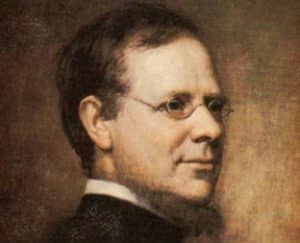
on the grains of wheat grown on upstate fields,
ground together, yeasted, kneaded, molded
and baked into individual loaves.
The vision of two as one being of light
the beauty that shone, the joy made second best
any other life, any other marriage,
any mundane work, would never seem right.
Always his angel beaconing him on
always the seeker going beyond
to find the ones who too wanted to live
spirit-led, passed their selves.
His innocence moved him among
the Brahmins of Brook Farm
where he chewed whole-grained ideas
and met the worthies of his day.
He spent a fortnight in Fruitlands baking
bread in the small oven of the brick hearth.
The only fruit to be found was bound
in the books of the contemplative saints.
Still unfulfilled, still an earnest seeker
he left to find the one truth he could love
searching in the storerooms of religion
and the open air of awakenings.
When he found his spiritual home
“Odd,” thought some; a betrayal, said others,
this democrat loyal to a monarchy;
swallow Roman bread, the communion of saints.
To be not just a convert but a priest
sent to study at a seminary
for him theology was made dead theory
by the intrusions of mysticism.
At his ordination in England
he held aloft for the first time the pure,
consecrated bread, the sacred source
of his never yielding sense of mission.
Back on his native shore, the steam priest voiced
the aspirations of his country’s soul,
asked the question of a free conscience,
“what is best for the good of the most?”
America, a place where there is more
hope than memory. The former is gone
all things are new. Optimism governs
every expansion and no end is seen.
The Catholic Church will be recreated
as the Spirit moves among free people
and democracy will be ever new
as Grace draws human nature to the truth.
Inspired by the Indwelling Spirit,
attentive to the movements in his soul,
convinced by his own experience,
as a native son, it was his to say
I am all the better Catholic
because I am an American.
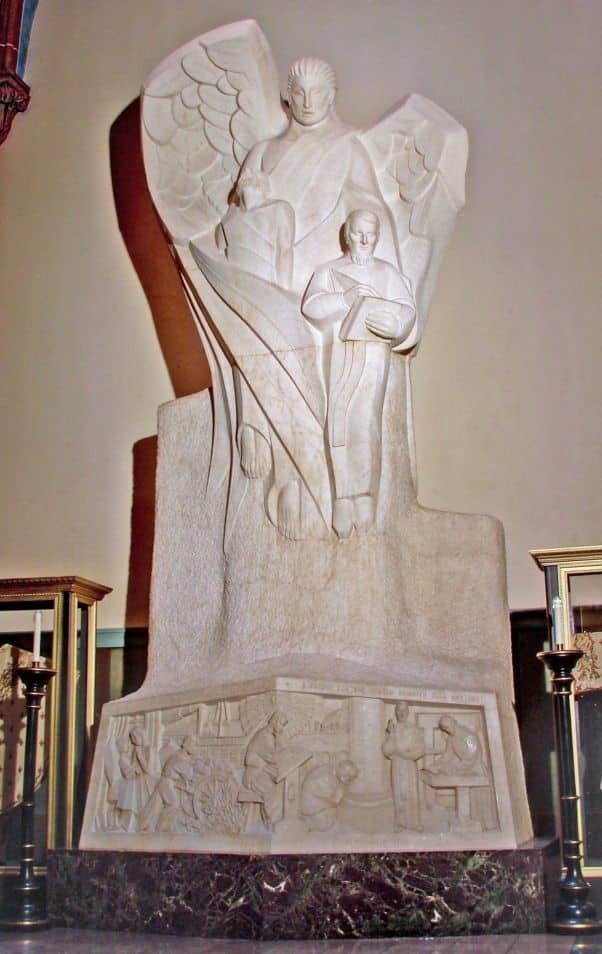
because, together, we are Catholic.
His enthusiasm to share his faith
with his fellows led him and four others
to seek the freedom to preach to their own
in the language and spirit of the age.
His enthusiasm for the mission
led him to sail to Rome to seek permission
to form a band of like-minded brothers
but instead he was met with rejection.
His enthusiasm led to their
expulsion. Cast out, alone in Rome
he died in prayer. Rather than give in
to despair, he trusted in the Spirit.
Surrendered to the Paschal mystery
He gave himself over to well-placed friends
Those familiar with the ways of the world
and — finely tuned the ways of God.
An order, a society of men
was born to make real that ever out front
vision of angel wrapped and Spirit led
life given and made whole and forever.
America, the new world’s garden
to be nurtured by missions and lectures
at the lyceums, where self-reliant
democrats heard of original grace.
The tour of American pulpits grew
to pamphlets and the birth of Paulist Press
a natural expansion when the goal is
nothing less than national conversion
Always expansion, movement and progress
fired by the joy of seeing the Spirit
at work in the world. Spurred to the next right
action by the Spirit’s inspiration.
Even the disease, whatever it was
was not enough to ever kill the spirit
even in recuperation, in the sun
along the Nile thoughts of a world mission.
Finally, he had to come home
To the community that embraced him
to the marble-white angel to lift him
to his final home.
Let me look back for a few moments and see where I stood last year this time (an incomprehensible length!) and where I now seem to stand. Then my faith was dim, unfixed and unsettled, then I was not so disentangled from the body and its desires as I hope in God I now am. In all I feel a consciousness that since then I have spiritually grown-been transformed. For my presence I cannot speak. For my future it seems I dare not speak. Dreams of the future! Exalted visions of the beautiful! Unspeakable hopes! Deep untranslatable longings that fill the conscious soul …
— from Hecker’s Diary, entry dated December 18, 1844, his 25th birthday
from Hecker Studies: Essays on the Thought of Isaac Hecker, edited by John Farina
|
1819 |
December 18, born in New York City. |
|
1825 |
Caroline Hecker listed as an active member of Forsyth Street Church. |
|
1832 |
ITH works for The Christian Advocate and Journal and Zion’s Herald |
|
1833 |
The Hecker brothers begin their baking business. |
|
1837 |
ITH becomes involved with the Equal Rights Party. |
|
1839 |
Attends Orville Dewey’s Church of the Messiah. |
|
c. 1839 |
Meets Mormon evangelist Parley P. Pratt. |
|
1841 |
July. Meets Orestes A. Brownson. |
|
1842 |
December. Visits Brownson’s home in Chelsea, MA. |
|
1843 |
January to July. Resides at Brook Farm |
|
1843 |
July. Visits Bronson Alcott’s Fruitlands. |
|
1844 |
August 2. Received into the Roman Catholic Church. |
|
1845 |
August. Joins Redemptorists. Departs for novitiate in St. Trond, Belgium. |
|
1846 |
October 15. Takes Redemptorists vows. |
|
1849 |
October 23. Ordained to priesthood in London. |
|
1851 |
April 6. Begins mission work in U.S. with fellow Redemptorists Hafkenscheld, Walworth, Hewitt, and Duffy. |
|
1855 |
Aspirations of Nature published. |
|
1857 |
August 5. Leaves for Rome to plead for English-speaking Redemptorist house. |
|
1857 |
Questions of the Soul published. |
|
1857 |
August 30. Expelled from Redemptorists. |
|
1858 |
March 6. Nuper Nonnulli issued. |
|
1858 |
July 7. “Programme of the Rule and Constitution of the Congregation of Missionary Priests of St. Paul the Apostle” issued. |
|
1860 |
November. Construction of the first church and convent at Fifty-Ninth Street completed. |
|
1862 |
ITH engaged in Lyceum lectures to non-Catholics. |
|
1865 |
April. Founds Catholic World. |
|
1866 |
Establishes Catholic Publication Society. |
|
1866 |
October 16. Addresses Second Plenary Council of Baltimore. |
|
1867 |
Attends Congress of Malmes, Belgium. |
|
1869-1870 |
Attends First Vatican Council. |
|
1870 |
June. Returns to the U.S. |
|
1871 |
December-Spring 1872. Gradual onslaught of illness. |
|
1873 |
June. Journeys to Europe for recuperation. |
|
1873 |
December to March 1874. Travels to Egypt and the Holy Land. |
|
1874 |
November. Writes “An Exposition on the Needs of the Church and the Age.” |
|
1875 |
October. Returns to New York. |
|
1876 |
June 4. Cornerstone laid for St. Paul’s Church and new convent. |
|
1884 |
September. Reelected superior by General Chapter. |
|
1887 |
The Church and the Age published. |
|
1888 |
December 22. Dies in Paulist House at Fifty-Ninth Street. |
by Servant of God, Isaac Thomas Hecker
Church of Saint Paul the Apostle, New York
The following is an edited version of a sermon delivered by Father Hecker on Christmas Day 1870. It is the only surviving sermon by Hecker on the subject of Christmas. It is provided here as a single sermon in three sections. This will allow you to copy or quote from it in its entirety in whatever form you may choose during the Christmas season.
God became man to facilitate man’s love for God. For had God become an angel and made himself visible to us, we would have been bound to love Him just as much as we are bound to love Him as a man. However this would have been more difficult for resemblance begets love. Thus when we seek to attract the attention of another or win their love, we seek to resemble them in our dress, our conduct, our speech and in all things. Just as a mother prattles with her child to gain attention and awaken its affection, so Christ takes the form of a servant being made in the likeness of men to captivate our hearts.
Christ was really truly man and being man bound us to love him not only by the law of resemblance, but by the strongest of ties. For it is the law of nature that “like loves like.” Birds love birds. Beasts love beasts, man loves man. God as man can bind us to Himself with cords of common sympathy, calls forth a spontaneous devotion and awakes the deepest and warmest affections of our hearts.
God is shrouded in our common humanity. Christ is our brother who we can approach with feelings of confidence and affection. When the Indians go out to hunt the buffalo, they cover themselves with buffalo skin. By this device they lose their fear of the animal and are allowed to approach near enough to shoot them. So Our Blessed Lord approaches us without awaking our fears, covers Himself with our humanity and captivates our hearts with the fire of His divine love. O blessed hunter of the hearts of man! O goodness and kindness of our God and Saviour.
The invisible became visible, God became man. Can the treasure of God’s infinite love be exhausted? Can God do more than this to win back His creatures? Yes! For God’s love acknowledges no limit and nothing is impossible with God. God can become a babe! For love not only surrenders itself to the object loved but surrenders itself in the form most attractive to the object loved. For in an infant we see all that is good, lovely and sweet in human nature without all that is repulsive.
Where is there a human heart that can resist this strategy of Divine love? The Almighty God as a helpless infant! Truly God has made himself of no account for our sakes. Look at the infant laying in the cold straw, in the poor crib, in the inclement stable! Who is so poor as to not learn a lesson in poverty? Who is so timid that fears to approach this helpless babe as he stretches out his little hands to show us love?
Do you not see O sinner that God has chosen a cave to come to us because it is open, so that we might have access to Him and request His pardon for our sins and be restored to His love? “Don’t fear me for I am helpless,” he cries. “Can you doubt that I entrust myself to you?”
Is this the same God who cried out to Adam after his fall and made the earth tremble? It is ! But not as Judge and Punisher but as Saviour, the Lamb who takes away the sins of the world. The Divine Lover of souls!
“Peace on earth to men of good will.” Peace. This is what all seek and not find. For God alone is its giver. For peace springs alone from the reconciliation with man and only God can produce this. O blessed peace, peace with God, a foretaste of Paradise! O blessed peace, peace among men, a heaven upon the earth! “Peace on earth.” The earth had no peace without God.
Before the birth of the Saviour the state of the earth was war, and today the state of nations which have abandoned the Saviour since his birth, is war. Might made right not truth and justice. So it is today. For Christ is the peace of the world. His kingdom is peace on earth.
“To men of good will.” Good will to all who earnestly and sincerely seek God. To all, whether Jew or Gentile, Christian or non-Christian for God is the Father of all and no respecter of persons.
O sweet infant Saviour, give to us that peace which you came to bring on the earth. Peace to the young and the old, to the poor and the sick, to the sorrowful and to all of good will. Peace on earth to all nations, especially to Your Holy Church (Papal States) and to Your Vicar the Pope who like You suffers from the hands of others. Peace to the world at war that your kingdom may begin!
Heavenly Father, you called your servant Isaac Thomas Hecker to preach the Gospel to the people of North America and through his teaching, to know the peace and the power of your indwelling Spirit. He walked in the footsteps of Saint Paul the Apostle, and like Paul spoke your Word with a zeal for souls and a burning love for all who came to him in need.
Look upon us this day, with compassion and hope. Hear our prayer. We ask that through the intercession of Father Hecker your servant, you might grant us (state the request).
We ask this in the name of Jesus Christ, Your Son, Our Lord, who lives and reigns with You and the Holy Spirit. One God, forever and ever. Amen.
When you pray this prayer, and if you believe that you have received any favors through Hecker’s intercession, please contact the Office of the Cause for Canonization of Servant of God, Isaac Hecker at [email protected]. Visit the web site: isaachecker.org to learn more about his life and the cause for his canonization.
by Fr. Ron Franco, CSP
Pastor, Immaculate Conception Parish, Knoxville, TN and
Vice Postulator of the Canonization Cause for Fr. Hecker
Originally posted on Fr. Franco’s City Father blog in December 2010
Today is the 122nd anniversary of the death of Paulist Founder, Servant of God Isaac Hecker, who died at the Paulist Mother Church in New York City on Saturday, December 22, 1888.
In his eulogy at Hecker’s funeral four days later, the Jesuit Provincial recounted the scene at Hecker’s deathbed, when his fellow Paulists asked for his final blessing: Hecker
“roused himself from the depth of pain and exhaustion, and his ashen lips which death was sealing pronounced the singular words … ‘I will give it in the shadow of death.’ His feeble hands were raised, and like a soldier dying on the field of battle he reconsecrated his followers in the name of the Father, Son, and Holy Ghost for the struggle in which they had chosen him as Leader.”
I’ve always liked that account of Hecker’s final blessing. As a Paulist, I feel included in that blessing and
so have reason today to be especially grateful for the holy life and heroic ministry of Isaac Hecker. For much of the first 25 years of his life, Hecker had been what today might be called “spiritual but not religious.” He was a spiritual seeker, searching for God in the various competing paths available in 19th century American society. In 1844, he finally found what he had been looking for and entered his new spiritual home in the Roman Catholic Church. Having found the object of his spiritual search, Hecker, now no longer a seeker himself, devoted the rest of his life to helping others find what he had found in the Church.
In his later years, Hecker summed it all up in these words from a letter to a friend: “How does Father Hecker? In body? Not so well for several months, but now improving. In spirit? Living and working in the dawning light of an approaching, brighter, more glorious future for God’s Holy Church. A future whose sun will first rise on this continent and spread its light over the world.”
Apologies to Heather McClory, an Associate from Toronto! We misspelled her name in the November issue when she was named as the author of two articles.
Fr. Walter Elliott, CSP, when researching materials for the first official Hecker biography, The Life of Father Hecker, uncovered the first correspondences Isaac had with his family while he was visiting Orestes Brownson. Brownson, who was Hecker’s mentor, was at the time a Unitarian Universalist minister with a home and church in Chelsea, Massachusetts, just 4 miles from Boston. Isaac sought out Brownson, who was 16 years older than he, to help him discern his mystical experience and his sense of call from the Divine. It was also during this time that Brownson introduced the idea of life at Brook Farm to Isaac.
Dated December 24, 1842, this letter from Isaac to his mother was the earliest of Hecker’s to survive. Quoted in The Life of Father Hecker, Isaac wrote to his mother on Christmas Eve.
“But as regards your advice to write my thoughts to you, that is an impossibility which I cannot govern or control. This out not to be so, but so it is. Am I to blame? I feel not. And what if I could tell? It might be only a deep dissatisfaction which could not be made intelligible, or at least not be felt as it is felt by me. Let us be untroubled about it. A little time, and, I hope, all will pass away, and I be the same as usual. We all differ a little, at least in our characters; hence, there is nothing surprising if our experiences should differ. I feel that a little time will be my best remedy, which I trust we will await without much anxiety. Resignation is taught when we cannot help ourselves. Take nothing I have said discouragingly. Turn fears into hopes and doubts into faith, and we shall be better if not happier. There is no use in allowing our doubts and fears to control us; by fostering them we increase them, and we want all our time for something better and higher.
Isaac wrote additional letters home over the next few days to his brothers, John and George, and mother. He wrote to his brothers on December 26, to the entire family on December 28, and to his mother again on December 30 as well as in early January. In each of these letters, he tried to allay his family’s fears that he was unwell. He also resisted their attempts to have him return home to New York. In these letters, he recognized that he had not contributed to the success of the family bakery business as did his brothers. Isaac did attempt to convey to them his interior thoughts and desires that emanated from his extraordinary experience — and how he struggled with loyalty to family and the compelling nature of the vision that led him on a different path.
You can find these letters in The Life of Father Hecker.
Ordination to the Priesthood —Matt Berrios, Steve Petroff, and Stuart Wilson-Smith
Church of St. Paul the Apostle, New York, NY — Saturday, May 20, 2017
The Paulists have reserved blocks of rooms. The most inexpensive rooms are at the Bishop Malloy retreat house in Jamaica, a section of Queens, NY. It’s a long subway ride from the church at 59th street. Single occupancy with a shared bath. There are also two hotels in mid-town Manhattan, close to the church. Register on the Church of St. Paul the Apostle website.
National Retreat for the Paulist Associates
St. Mary’s on the Lake, Lake George, NY — Sunday, July 2 to Friday, July 7, 2017
Paulist Pilgrimage
Baltic Sea Cruise and St. Petersburg, Russia — July 21 to August 1, 2017
With Fr. Tom Kane, CSP, Fr. Eric Andrews, CSP, and Fr. John Ardis, CSP
Registration and details on paulist.org/pilgrimages
A Kingdom of Unlikely Followers
A Retreat with Fr, Stephen Bell, CSP, Fr. John Collins, CSP, and Fr. Tom Gibbons, CSP
Friday, November 10 to Sunday, November 12, 2017
Marble Falls, TX
Details at paulist.org/texasretreat
(This is a suggested format; each group may select another outline or topic.)
Theme: St. Paul’s Conversion and Calling
Opening Prayer: The Paulist Prayer Book, January 25: The Conversion of St. Paul the Apostle, pages 349-352
Reading (in advance of the meeting):
From Meeting St. Paul Today: Understanding the Man, His Mission, and His Message
by Daniel J. Harrington, SJ, p.9-10
Paul’s Conversion and Calling
Around A.D. 32 or 33 Paul, a Jew born in Tarsus of Cilicia, a Pharisee by choice, and a persecutor of Christians by conviction, underwent a remarkable transformation. What happened to Paul can be called a “conversion,” at least in the sense that he moved from Pharisaic Judaism to Christian Judaism. This life-changing experience also involved a call to proclaim Christ to those who had not heard of him, especially to non-Jews.
In Galatians 1:15-16 Paul describes his transformative experience of the risen Christ partly to defend the divine origin of his apostleship. “But when God, who had set me apart before I was born and called through his grace, was pleased to reveal his Son to me, so that I might proclaim among the Gentiles …” By evoking the language of Jeremiah 1:5 (“… before as I born and called me …”), Paul places his experience in line with the Old Testament stories of people being called by God (Abraham, Moses, David, Isaiah, Jeremiah, Ezekiel, and so on) and also insists that his experience involved the special vocation of bringing the good news to non-Jews. Paul maintains that his apostleship and his call to bring the gospel to the Gentiles came directly from “Jesus Christ and God the Father” (Galatians 1:1). Only later did Paul confer with the Jerusalem apostles (Galatians 1:8; 2:1), who in turn approved his calling to “go to the Gentles” (2:9).
In Philippians 3, in response to the attacks on his apostleship by other Jewish Christian missionaries, Paul observes that his experience had changed his perspective entirely. “I regard everything as loss because of the surpassing value of knowing Christ Jesus my Lord” (3:8). In light of this experience, Paul’s sole desire became knowing “Christ and the power of his resurrection and the sharing of his sufferings by becoming like him in his death” (3:10). This is the heart of Paul’s spirituality. It involves a kind of mysticism well expressed by Paul himself: “It is no longer I who live, but it is Christ who lives in me” (Galatians 2:20).
Conversation Catalysts
- What similarities and differences do you see in St. Paul’s conversion and that of Isaac Hecker? In their missions?
- What is one of your favorite passages from one of St. Paul’s letters, and why is it significant to you?
- How do you discern God’s call in your life?
News/Announcements
Closing Prayer
St Paul, you became all things for all people, placing yourself totally at the service of others, and putting aside your own self in order to do so. Pray for us, that we might have the grace to come out of ourselves and to take advantage of the amazing tools available to us, which allow us to encounter others across great distances. Pray that we might be help in God’s saving work. Amen.
Some Associates are looking for additional resources for a more in-depth reflection on the life and works of Servant of God and founder of the Paulists, Isaac Hecker. For the next several months, we will feature a book, article, web site, or other resource to consider for further study by individuals and perhaps by the local groups.
Your recommendations are welcome. Please send your suggestions to Paula Cuozzo at [email protected].
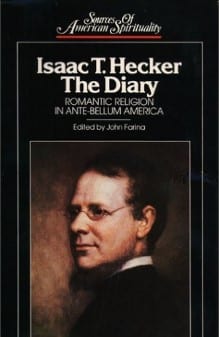
edited by John Farina
At the age of 24, Isaac Hecker began to chronicle his interior thoughts, desires, and questions in a series of diaries for approximately 30 months. This period in his life proved to be crucial in his development, coming evermore under the influence of Orestes Brownson, and soon thereafter with the Transcendentalists in Massachusetts. It is within these years that Hecker converts to Roman Catholicism. Truly, his spiritual pursuits and discernment began in earnest at this time.
We learn within these pages of Hecker’s first mystical experience, of his time living at the Transcendentalist communities of Brook Farm and Fruitlands, of his ultimate rejection of the philosophy of the Transcendentalists, and of his embrace of the faith tradition within the Roman Catholic church.
Because this is a primary source of Hecker material, the reader will have first-hand access to his spiritual quest. The reader will also come to appreciate Isaac’s unique ability to synthesize the inspirations of the Holy Spirit that lay a foundation for his vision and language of religious experience as a Catholic and an American.
Paulist Associates National Director
Frank Desiderio, CSP
Paulist General Office
New York, NY 10023
Board Members
Angie Barbieri
Toronto, ON, Canada
Paula Cuozzo
Boston, MA
Cathy Hoekstra
Grand Rapids, MI
Mike Kallock, CSP
Terry Modica
Tampa, FL
Paul Robichaud, CSP
I believe that I am drawn by the Holy Spirit to the spirituality and qualities of the Paulist Community. I have discerned both by prayer and study that God calls me to become associated with the Paulists. I promise that I will pray for the works of the Paulist Society, meet with others, who are also members of the Paulist Associates, for spiritual sharing and formation; and I seek to embody the apostolic qualities of the Paulists in my daily life.
Attentive to the Holy Spirit and faithful to the example of St. Paul and the charism of Father Isaac Hecker, I commit myself for one year of membership in the Paulist Associates.
